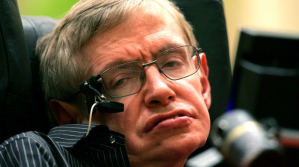
Prominent British scientist Stephen Hawking, 72, has said that advancements in artificial intelligence could bring about the end of the human race.
The famous astrophysicist made his warning in response to a question about a technology revamp that he uses to communicate. According to Rory Cellen-Jones of the BBC, Hawking's communication technology relies on a basic form of artificial intelligence.
"The primitive forms of artificial intelligence we already have, have proved very useful," Hawking said to the BBC. "But I think the development of full artificial intelligence could spell the end of the human race."
Hawking expressed fears about the consequences of creating something that could match or exceed human capabilities.
"It would take off on its own, and re-design itself at an ever increasing rate," he said. "Humans, who are limited by slow biological evolution, couldn't compete, and would be superseded."
Hawking suffers from the motor neuron disease amyotrophic lateral sclerosis, commonly known as ALS, leaving him almost totally paralyzed. However, the BBC notes that he can still speak by using a using a new system developed by Intel.
According to Stuart Clark of The Guardian, Hawking's new system incorporates predictive text, allowing him to type twice as quickly as before and send emails ten times faster. The BBC states that this same technology is also used as a smartphone keyboard app, which was created by British company Swiftkey.
"I was finding it very difficult to continue to communicate effectively and so do the things I love to do," Hawking said at a London press conference. "With the improvements made, I am now able to write much faster and that means I can continue to give lectures, write papers and books, and, of course, speak with my family and friends more easily."
Hawking added that he relies on technology to help him communicate and live because "medicine has not been able to cure me."
Despite his warning about artificial intelligence, the BBC noted that he has been an enthusiastic early adopter of all kinds of communication technologies. Hawking has indicated that he is looking forward to working with his new system, which hasn't been upgraded in nearly 20 years.
"I hope it will serve me well for the next 20 years," he said.
According to Clark, Hawking controls the Intel software via an infrared sensor attached to his glasses by moving the muscle in his cheek. Predictive text pops up as he selects letters, speeding up the communication process.
Intel principal engineer and project leader Lama Nachman described how the software, which will be freely available to developers and researchers in January 2015, will help improve the quality of life for Hawking and other disabled people.
"Opening a document used to take 3-4 minutes," she said. "The new system uses a specific icon and takes about 10 seconds."
Even though his communication system went through a major upgrade, Hawking has kept his signature computer-generated voice. Although it may sound slightly robotic, Hawking told the BBC that he didn't want a more natural voice as a replacement.
"It has become my trademark, and I wouldn't change it for a more natural voice with a British accent," he said. "I'm told that children who need a computer voice, want one like mine."







